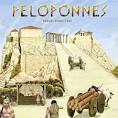
Peloponnes (4th ed)
Game designer Bernd Eisenstein's first published title was Maya from Abacusspiele in 2003, and although five years passed from that point until the release of his next design -- Kosmos' Zack & Pack in 2008 -- he wasn't idle during that time, with alea iacta est seeing print in early 2009 from alea and now Peloponnes from his own company, Irongames.
In Peloponnes, each player is trying to establish one of seven different civilizations in 1,000 BC. To do this, they must erect buildings and annex land to be developed, thereby increasing both their wealth and their population. Your goal: Nothing less than being the most dominant civilization on the peninsula at the start of a new millennium. To do this, you'll bid for tiles each round, with one chance to overbid others or bid on a different tile. After players take income from their holdings, two disaster tiles are revealed; if the third instance of a particular disaster is revealed, all players must suffer from it -- although some buildings will shield you from these effects.
All land and building tiles provide victory points, and each inhabitant is worth three victory points as well. Two complications, however: First, you must feed your civilization's inhabitants twice during the game and once again at game's end or else see them starve. Second, your score at the end of the game is the lower total of your population points and your land/building points.
Says Eisenstein, "Peloponnes offers a deep playing experience in a reasonable amount of time. There is even a solitaire variant included in order to learn the game, and a level system in order to gauge improvement and add new challenges to the solo game. If that isn't enough, there is already an expansion available, including components for adding a sixth player, new building tiles, and a sea variant with special tiles for more tactical possibilities."
Games Magazine Awards
Best Advanced Strategy Nominee, 2011
User Reviews (1)
Add a Review for "Peloponnes (4th ed)"
You must be logged in to add a review.

Peloponnes starts with drawing a random starting city, each with a different number in red (center) that determines the initial order of play. I also ordered the ocean expansion, adding a handful of other starting cities.
On each card there are numbers and icons, basically ordered as
left = what you must pay
right = what it gives you
top = once
bottom = systematically every turn.
Once you repeat that a few times everyone gets it.
Each round 5 tiles are drawn from deck A until it is depleted, then from deck B then C, and if you have the ocean expansion and decided beforehand on the longer game, you also do D, otherwise it’s done after C.
You bid in order on one tile or pass, if you don’t have enough money, and some events come up that require you to pay 1 grain for each citizen or else the part of citizens that can’t eat dies. If you come up grain short, you can supplement from luxury goods ( luxury goods thematically are sold to the barbarians outside Greece and you get 1 ‘grain’ for each 2 lux).
You can focus on being exceptionally well in wood or stone, which overflows and becomes luxury goods. People often forget that grain tiles are very important, so they get underbid a bit.
Furthermore there are some distasters that flavor up the game a bit, but it’s mostly tableau management. What makes this game so much fun?
1. Replayability. Each faction is different enough and the combinations are many ( 10! ~3.7 million)
2. managing your tableau and buildings/land starts off easy but becomes more complex in a linear fashion.
3. game doesn’t take long, under 30 minutes, with no downtime.
4. exciting bidding and events invite you to adapt.
5. the components shuffle well, and setup and teardown time is minimal, under a minute.
6. No dice, no card shuffling, but random nonetheless!
7. Almost no explanation needed (provided you know the rules) people can immediately learn on-the-go.
I did get a cloth drawstring bag to make the drawing of lots (starting cities) a bit more thematic. And I added a black drawstring bag for increased drama if a possible disaster fiche had to be drawn.
I did have some difficulties understanding the rules there were some caveats that required re-reading but after setting it up myself and playing against my alter ego I quickly got it. After that it is easy to teach.
I introduced the game to about 2+5+3+3+3 ~ 15 different persons and except for my gf that always hated when she had to let her population starve, everyone else liked it and would like to play again.
There is no take-that, but it’s not autistic my little kingdom either, it has some interactive moments, namely the bidding. You can sometimes outbid someone that desperately needs some resource, but then again they probably should have managed their kingdom better, so it’s not really that aggressive.
Highly recommended, there is absolutely nothing I can criticize the game on, only the box is a bit big, it allows for expansions, but this version is the only one I will ever want anyway, so I might cut up my box to make it half the size it is.
On the light side for gamers, a bit too light for heavy euro gamers, but for them it would be a nice warmup/cooldown game.